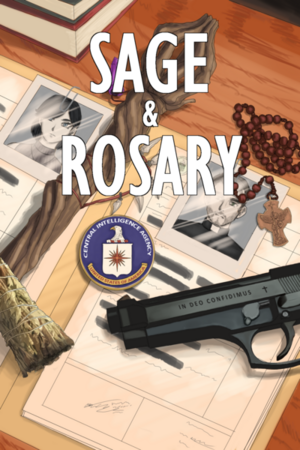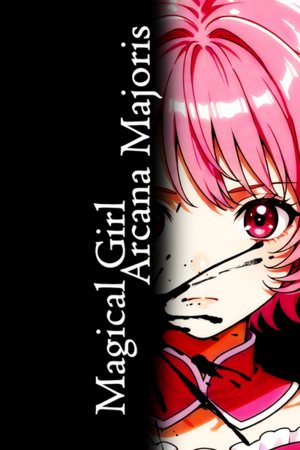Chapter 32:
The Final Edit
Error 404: Language Not Found
Dear reader, once again, don't lie.
Not because it’s wrong. Not because it’s dangerous. Not even because it might unravel reality like a sentence with no subject.
Don’t lie because eventually… someone will lie better than you.
I told a story.
I made up gods, myths, tombs—fabricated prophecies like I was playing literary jazz. But there was someone else already telling a story underneath mine. A smarter one. Colder. More precise.
Hana.
She wasn’t just skeptical. She wasn’t just suspicious. She was in control.
I see it now—everything I missed.
She was at the scene of the crime before the crime. She almost caught me the moment I went to find the man behind the post. Because she’d already been there.
She fought my narration at every step. Questioned every word. Watched every lie I told like she was measuring how much truth I was accidentally spilling.
She didn’t just not trust me.
She knew exactly what I was. Or more precisely, what I wasn't.
And now I know what she is.
This whole time, she wasn’t trying to stop the apocalypse.
She was making sure it happened.
And me? I told the story she needed me to tell. I built the path. Filled it with distractions and jokes and chaos. All while she laid the groundwork for something darker.
She never wanted to save the world.
She just wanted to outlive it.
I want to scream. I want to go back and tear out every page I wrote that let her stay hidden. I want to apologize to Kaito. To Sota. Even to the parrot.
But I can’t.
Because I don’t have time.
I’d love to break down every breadcrumb she left behind, every moment where I should’ve noticed her watching instead of reacting.
But the truth is, dear reader…
I have a world to save.
And if I’m not too late—maybe, just maybe—
I can rewrite the ending.
----------------------------------------------------------------------------
When I returned to physical form, it wasn’t for dramatic flair.
Okay, it was mostly for dramatic flair—but also because I needed to look them in the eye when I told them the truth.
I materialized just beyond the cracked arch of the inner tomb—glowing faintly, notebook floating behind me like a cape I didn’t deserve. The world was quiet. Too quiet.
And then I saw them.
Kaito, hunched near the center, holding his head like he was trying to remember how to be. Sota crouched beside him, rocking slightly, eyes wide and wild. The parrot sat on a stone slab, unmoving, as if stunned into silence.
And Hana stood above them.
Calm.
Unbothered.
Alone.
“Hey!” I called out, stepping forward. “We have a problem.”
Kaito looked up.
His mouth moved.
But what came out wasn’t language.
“…grahh…”
I stopped cold. “What?”
Sota tried next. “Me… is… am… not… words… where word go?”
He grabbed his own face, panicked. “Brain not hold!”
The parrot flapped wildly. “Squawk! Grammar—bad! No talk!”
Even he couldn’t manage a full sentence.
And that’s when I knew—
They weren’t just affected.
They were gone.
Language had collapsed in their minds like a cathedral stripped of vowels.
They could think. They could feel.
But they couldn’t say anything anymore.
Except one.
Hana.
She turned to me. Calm as ever.
“You’re too late.”
I took a step forward. “Are you seriously willing to let the world end… just for a place on the throne?”
“I didn’t want a throne,” she said coolly. “I wanted progress.”
“You built a virus that made communication impossible!”
“No,” she snapped. “I made a hierarchy.”
“You framed Kaito.”
“He was a convenient distraction.”
“You killed the man in the U.S.”
“He was going to tell the truth.”
I stared at her, horrified.
She stared back, calm.
“Humanity was already dying,” she said. “You know how many researches are stopped just because one politician doesn't believe in climate change?”
“I know everything.”
“My point is, the only way forward was to force them to give power to those who deserve it.”
“And how did that work for you?”
Hana rolled her eyes. “All they had to do was to let us, the ones not affected, help them,” she said. “And they built emoji languages and took over the UN.”
“You can still revert it. You and I both know that.”
Hana laughed. “I'd rather take my chances in this world than to wake up killed by a nuclear bomb thrown by a stupid billionaire.”
“Too bad you don't get to choose.”
I turned away from her.
Time was flexible here. The story’s spine bent in the walls. I could feel it—every second of past, present, and future stacked like poorly edited fanfiction. And somewhere, buried in the margins, was a point I could still rewrite.
Kaito. Before the virus reached him.
If I could get there—
I raised my hand and reached into the air, fingers curling around the sentence that would take me back.
“I go back to—”
“Don’t you dare,” Hana said.
Her voice didn’t shake.
She wasn’t bluffing.
But I didn't turn around. “You’ve already lost.”
“You’ll undo everything.”
“That’s the idea.”
She was moving before I could finish the thought. A blur. A hiss of breath and fury.
I saw her before she struck—saw every angle, every intention. I was the narrator again. The story bent around me like I was its author and editor and deadline all in one.
Still, I didn’t expect the speed.
She hit me mid-sentence.
I staggered back—solid again, briefly—and she slammed a blade into my side. Not deep. Just enough to remind me she was still dangerous.
“You think you can just rewrite me?” she growled.
I pulled the blade out and let it drop with a clang. “No. I think I can stop you.”
She lunged.
This time, I didn’t dodge.
I rewrote.
One second she was in front of me—mid-attack—and the next, she was stumbling as the floor moved. Her foot landed in a hole that hadn’t been there.
“I control this place,” I said, voice layered in echo. “You’re fighting me on my own page.”
“You’re stalling,” she said, flipping into a roll, throwing a dagger my way.
I snapped my fingers.
The dagger curved mid-air and stuck harmlessly into the stone beside me.
She didn’t blink. She just kept coming. Her eyes weren't calculating anymore. She was panicking, slipping. I could see the rage and feel the pain.
I gave myself three copies. One drew her attention. One narrated from above. And the real me slipped behind her and whispered, “You can’t stop me.”
She elbowed the illusion. It vanished in smoke.
She struck at the wrong me. He flickered and faded.
And then she spun—found the real one—and landed a solid hit to the jaw.
Pain snapped through me.
“I don’t need the story,” she hissed. “I just need you dead.”
I laughed.
It was instinct, not strategy.
“You think death stops narration?”
She didn’t answer.
She lunged again.
I didn’t move.
Instead, I said the words:
“Hana missed.”
She did.
Stumbled.
I whispered again:
“Hana fell.”
And she crashed into the tomb wall.
I walked toward her slowly.
“You’re brilliant,” I said. “You built a plan so cold and calculated, it nearly worked. But you made one mistake.”
She looked up, blood on her lip, fury in her eyes.
“You forgot I was still part of the story.”
She lunged again. We clashed. Echoes and sparks. Narration against precision. I sent clones. She deleted them. She slashed my shoulder. I glitched her feet.
And then—by reflex—I shouted:
“She’s gone!”
It was a sentence. A powerful one.
It was a sentence. A powerful one.
Because the moment I said it, she froze.
Eyes wide.
The narrative wrapped around her like a trap snapping shut.
“No—” she started, but the words never finished.
She unraveled.
Not exploded. Not bled. Just… vanished. Like her character had been written out.
A footnote with no page number.
I stood there, stunned, still holding a sentence I hadn’t meant to say.
“I—I didn’t mean—” I muttered.
The echo of her presence lingered.
Smoke. Silence. A faint crackle of erased tension.
I looked at where she’d been.
And whispered, “...Oops?”
Then I straightened.
The story was unstable.
The walls flickered.
The time stream shifted.
I stepped back into the center of the tomb. Raised my hand to try again—
And that’s when the new voice said:
“But what the narrator didn’t know yet… was that he wasn’t the one in charge of the story anymore.”
“Excuse me?!” I called into the void. “Who the hell are you?”
A pause.
Then, with theatrical timing no doubt approved by the Union—
“Just doing my job.”
And then I saw him.
Not physically. Not exactly. But in the way narrators perceive each other—through style.
He spoke in third-person omniscient with just a hint of sarcastic detachment. The type that wore loafers inside metaphors. He was the narrative equivalent of someone who only drinks black coffee and wins every argument at book club.
“You’re not authorized to be here,” I snapped.
“Your contract expired the moment you became a journalist,” he replied, as if quoting legal paperwork. “You abandoned your omniscience. Edgar reassigned the slot.”
“Edgar Allan Poe sent you?”
“Technically, the council approved it, but yeah. Edgar stamped it.”
“Oh that fu-” I shouted. “I just came back! I literally renarrated reality thirty seconds ago!”
“Which was your final act under emergency clause. Congratulations.”
I glared into the metaphysical presence of narrative authority.
“I’m not done.”
“The system says otherwise.”
Behind me, the walls of the tomb began to fade.
Not crumble.
Fade.
Like the scene itself was being rewritten. My scene. My timeline.
And the worst part?
He was narrating it as it happened.
“The floor beneath the narrator cracked, splintering like a forgotten subplot. Walls once filled with tension began to flicker—first mossy and ancient, then empty, unfinished. Characters slowed, suspended in half-spoken thoughts.”
I turned toward Sota—mid-sob, mouth open in a malformed “wh”—frozen. Kaito, stuck mid-run. The parrot paused in a mid-flap, eye twitching like he knew what was coming.
“No,” I breathed. “Don’t do this.”
“The narrator begged. But his words, once reality itself, were now just dialogue—recorded, but no longer active.”
“You smug footnote of a man!” I shouted. “You’re dismantling the world!”
“The world was already dismantled,” he replied. “I’m just narrating the clean-up.”
I backed toward the door—any door—but they were gone. All of them.
Even my notebook turned to static.
“The pen slipped from his hand, no longer divine. The world shrank around him like a metaphor stretched too far.”
“You can’t end it like this!” I yelled. “They were trying to fix it!”
“No one reads stories about people fixing things,” he said. “Only stories where they try, and fail beautifully.”
I felt myself flicker. Memory, tone, presence.
“And just like that, he closed his eyes, and he died.”




Please sign in to leave a comment.